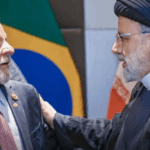
The PNV and the PSE-EE have closed this Monday a “pre-agreement” to govern as a coalition in Euskadi for the third consecutive term. Both formations have announced it after 9:00 p.m. after, throughout the afternoon, there have been meetings of the respective executives and the last details have been finalized. The pact will allow Imanol Pradales to be invested with an absolute majority in the Basque Parliament on June 20 and to take office two days later in Gernika. Of course, there is still the final drafting of a specific program and defining the entire structure of the new Executive.
The eleven-page document includes a reference to “reaching an agreement for a new statutory pact that allows progress in self-government and contributes to the progress of Euskadi.” It is a novelty because in 2016, when cohabitation between both parties began, the statutory part was in the “agreed discrepancies” box. In fact, the PNV came to close the foundations of a new self-government framework with EH Bildu with a more sovereignist approach, although the Catalan ‘procés’ truncated that path.
“EAJ-PNV and PSE-EE (PSOE) share that more self-government means more and better well-being for the entire Basque society. Thus, both parties face this new legislature with a double objective: full compliance with the Statute of Gernika and achievement of the bases to develop a new statutory pact through negotiation, agreement and maximum political consensus in the Basque Parliament, in the scope of its competence and current legislation. We transfer to these Bases in accordance with the pact reached on November 10, 2023 on self-government between the Basque Nationalist Party and the Spanish Socialist Workers Party,” they detail. Indeed, Pedro Sánchez agreed to that point with the nationalists and now that is transferred to the Basque Parliament.
They also add: “Both parties agree that a modern society like the Basque must respond to the challenge of creating and distributing wealth, in order to fight against inequality, as well as the great transformations that we must face: challenge demographic, digital transformation, sustainable economy or changes in employment, counting on financial resources that allow quality public services and the promotion of productive investment. Likewise, even being aware of the transversal and qualified majority that both political formations represent, EAJ-PNV and PSE-EE (PSOE) agree on establishing as a shared objective the search for the involvement of all social, union, business and political organizations, as well as the rest of the country’s institutions, in the development of these policies.”
The pre-agreement, which does not reveal how the portfolios of Pradales’ first cabinet will be distributed, although the socialists have announced that they want more weight than their three current councilors and 15% of the budget, mentions the importance of climate change – “we do not have planet B” – or a “defense of LGTBIQ+ equality and diversity” as fundamental pillars. Regarding terrorism, the following reference is made: “We must never forget where we come from. With the aim of promoting a solid and fair model of coexistence, we propose to promote an approach based on four pillars on which to build a more just, equitable and peaceful society: delegitimization of violence; comprehensive recognition of all victims of rights violations; construction of an inclusive, critical and ethical memory; and promotion of ethical and democratic principles and values.”
In terms of public services, Health is mentioned as the first priority, followed by care, housing or education, but also security or Basque, of which we want to “increase its use in all areas of life.” In the economic sphere, the programmatic bases of PNV and PSE-EE appeal to the “reindustrialization” of Euskadi “taking advantage of the opportunities” of the energy and digital transition and to “promote an economic growth model that generates equitable wealth and quality jobs” .
As this newspaper announced, two PNV negotiators and many other socialists have cooked up this agreement. They are Peru Salaburu, journalist and advisor to Iñigo Urkullu since 2023, and Aimar Rico, former collaborator of Pradales in the Bizkaia Provincial Council, where he quickly gained his trust. On the other side of the table, the socialists have as references Ekain Rico, parliamentarian and great negotiator of the party in recent years, and Pau Blasi, a journalist by training and responsible for the latest electoral programs. There are four men and none of whom are over 45 years old. However, the last word this Monday was given, at the highest level, by the ‘jeltzale’ president, Andoni Ortuzar, and the socialist general secretary, Eneko Andueza.
In the case of the PNV, a national assembly must endorse the coalition. The socialists will submit it to the grassroots for consultation. This Friday, Pradales’ candidacy for lehendakari will be formalized so that the investiture session will be held in Vitoria on the following Thursday and on Saturday the institutional protocol will be completed with the oath under the Gernika tree. 49 years old, Pradales will be the sixth lehendakari in democracy, all of them men.
Source: www.eldiario.es

